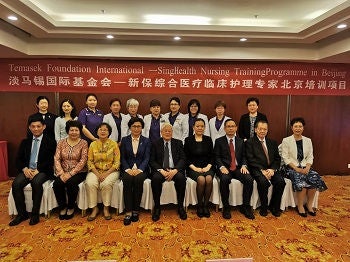HealthXchange will NEVER ask you to transfer money over a call. If in doubt, call the 24/7 ScamShield helpline at 1799, or visit the ScamShield website at www.scamshield.gov.sg.

• Programme to reach out to more than 1,200 nursing professionals from 16 hospitals in Beijing
Singapore (21 May 2019) – SingHealth, Peking Union Medical College Hospital and Peking University First Hospital today signed a Memorandum of Understanding that will see Singapore’s largest public healthcare group work with more than 500 specialist nurses and nurse leaders from 16 leading hospitals in Beijing, China.
Under the three-year programme which is supported by Temasek Foundation International, 500 specialist nurses and nursing leaders from Beijing will participate in workshops on clinical management, patient safety, risk management and quality improvement. The workshops will be conducted by nurse educators from the SingHealth Alice Lee Institute of Advanced Nursing.
As part of this mutual learning programme 70 specialist nurses and 30 nursing leaders from Beijing will be attached to SingHealth institutions to gain further insights and understanding into Singapore’s healthcare system and policies. A select group will go on to share what they have learned with 700 more nurses in Beijing to multiply the benefits of the programme.
Associate Professor Chua Yeow Leng, Group Director, SingHealth International Collaboration Office, said: “SingHealth is privileged to partner Peking Union Medical College Hospital and Peking University First Hospital programme to advance nursing capabilities and patient care. We look forward to learning from one another and sharing best practices as we build a strong pipeline of competent nursing professionals in our respective countries.”
Mr Benedict Cheong, Chief Executive, Temasek Foundation International, said, “Nursing is at the forefront of health care, which is an essential pillar of growth for any community. Through this nursing programme, nurse leaders and specialists from China and Singapore will get to share their experience and learn from each other, which will ultimately benefit their respective communities. We hope their interactions can also lead to fresh ideas and innovations in health care and enhance existing networks of cooperation for both communities.”
Get the Health Buddy App
© 2025 SingHealth Group. All Rights Reserved.













 Get it on Google Play
Get it on Google Play